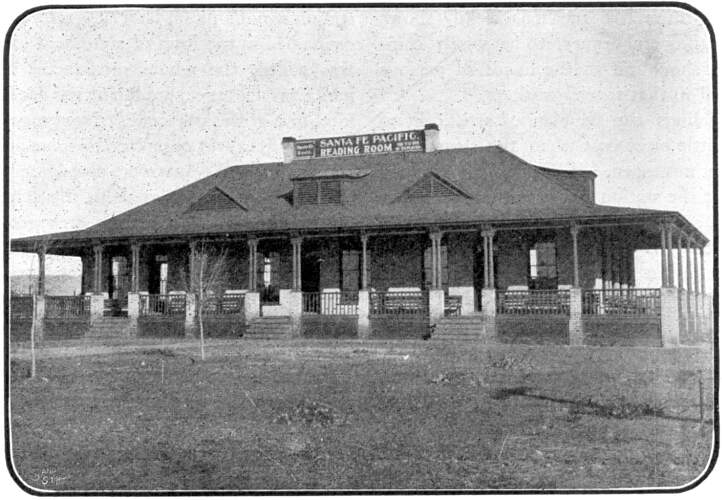 Social Centers For Railroad Men
BY THE EDITOR
Social Centers For Railroad Men
BY THE EDITOR
The Chautauquan Magazine—June,
1904
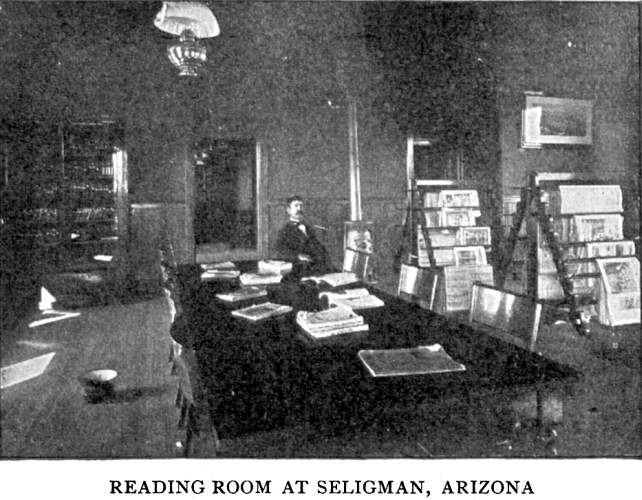 A HOME-LIKE place to bathe and rest in, a
practical social center for railroad men capable of serving the
interests of family and neighborhood, a common meeting place for
discussion, entertainment and enlightenment, things pleasant and
things worth while to read, means for self-development of character
and efficiency—these are the provisions which have made the
Santa Fe Reading Rooms noteworthy. The company now appropriates
some $15,000 a year for maintaining the reading rooms, and the
genius behind the chain of institutions is Superintendent S. E.
Busser. A HOME-LIKE place to bathe and rest in, a
practical social center for railroad men capable of serving the
interests of family and neighborhood, a common meeting place for
discussion, entertainment and enlightenment, things pleasant and
things worth while to read, means for self-development of character
and efficiency—these are the provisions which have made the
Santa Fe Reading Rooms noteworthy. The company now appropriates
some $15,000 a year for maintaining the reading rooms, and the
genius behind the chain of institutions is Superintendent S. E.
Busser.
Take your map and note the stretch of country traversed by
the rails of the Santa Fe system from Kansas, through Indian Territory,
Oklahoma, Colorado, New Mexico and Arizona to California. Besides
the (omnipresent) railroad branches of the Y. M. C. A. at Argentine
and Topeka, Kansas; Cleburne and Temple, Texas; locate Emporia,
Newton and Dodge City, Kansas; Purcell, Indian Territory; Woodward,
Oklahoma; La junta, Colorado; Raton, San Marcial and Albuquerque,
New Mexico; Winslow and Seligman, Arizona Territory; Needles,
Barstow and East Yards, California. At these fourteen places,
some of them popularly dubbed as "jumping-off places"
so far as civilized comforts go, one finds the company reading
rooms, localizing a moral, social and intellectual movement in
many respects unique in railroad management.
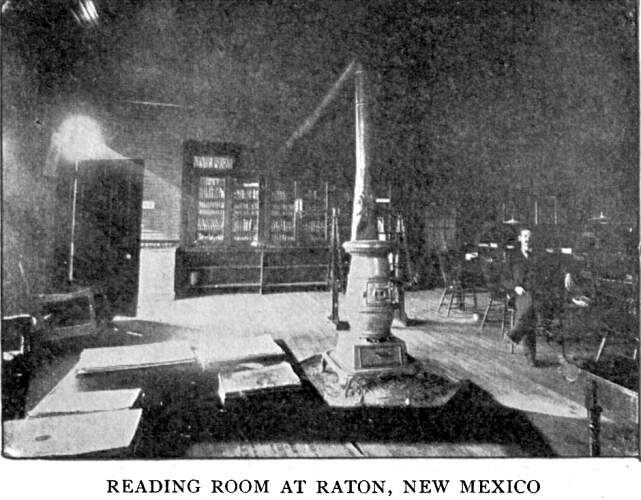 There are separate structures costing as much
as $8,000; in other cases extensions of company buildings have
been utilized. Each reading room is in charge of a librarian,
a salaried employee selected with an eye to his intellectual and
personal qualities. The equipment begins with a reading room supplied
with the periodicals and a circulating library of books; card
rooms, billiard rooms, bath, toilet and wash rooms, sleeping rooms
and bowling alleys being included in complete structures. The
privileges are free to all employees who are regularly on the
company's pay roll. Only nominal charges are made for bath supplies
furnished and use of billiard tables. There are separate structures costing as much
as $8,000; in other cases extensions of company buildings have
been utilized. Each reading room is in charge of a librarian,
a salaried employee selected with an eye to his intellectual and
personal qualities. The equipment begins with a reading room supplied
with the periodicals and a circulating library of books; card
rooms, billiard rooms, bath, toilet and wash rooms, sleeping rooms
and bowling alleys being included in complete structures. The
privileges are free to all employees who are regularly on the
company's pay roll. Only nominal charges are made for bath supplies
furnished and use of billiard tables.
That these institutions are a part of a system does not mean
that they are stereotyped in form or spirit. Fundamentally the
idea has been to find out the human needs of the men under the
conditions obtaining at any given point, and having found those
needs plans have been adapted to them. In other words no taint
of Pharisaical charity on the part of the company, has marred
the work, and the men have felt free to make known their special
interests in the kinds of literature to be supplied, technical
or otherwise, as well as in the character of instruction by lectures
and the extent of social activities and home talent entertainments.
The growth of cooperation between official and men in this way
has been one of the most striking effects of the innovation.
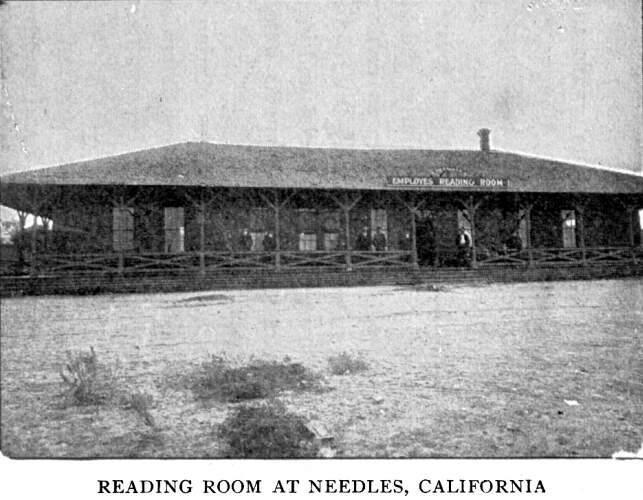 One cannot even briefly talk with Superintendent
Busser without discovering a living embodiment of this spirit,
and fortunately his enthusiasm is contagious. He will tell you
that the success of the experiment should be credited to President
E. P. Ripley's belief in more intelligence as a means of securing
better service—the essence of the policy which has been inaugurated.
And then he will tell you with equal delight how Santa Fe men,
in audience assembled, have questioned some of the most expert
authorities to a standstill on their own specialties when they
least expected it. So is comes about that only first-class speakers
and entertainers, eminent educators and specialists, interpretative
readers and technical experts are taken over the line to appear
before the men, and one sees a remarkable adaptation of the old
lyceum or the newer extension lecture system to modern industrial
conditions. Practical talks on such subjects as the care of the
teeth, hygiene, memory training, etc., as well as scientific,
historical, biographical and literary topics are given. One cannot even briefly talk with Superintendent
Busser without discovering a living embodiment of this spirit,
and fortunately his enthusiasm is contagious. He will tell you
that the success of the experiment should be credited to President
E. P. Ripley's belief in more intelligence as a means of securing
better service—the essence of the policy which has been inaugurated.
And then he will tell you with equal delight how Santa Fe men,
in audience assembled, have questioned some of the most expert
authorities to a standstill on their own specialties when they
least expected it. So is comes about that only first-class speakers
and entertainers, eminent educators and specialists, interpretative
readers and technical experts are taken over the line to appear
before the men, and one sees a remarkable adaptation of the old
lyceum or the newer extension lecture system to modern industrial
conditions. Practical talks on such subjects as the care of the
teeth, hygiene, memory training, etc., as well as scientific,
historical, biographical and literary topics are given.
Wives and daughters have days of privilege at the reading rooms,
and social clubs have been organized in connection with them.
To repeat, the theory underlying these establishments has been
epitomized in the phrase, "give every man a chance."
And the objects have been further summarized as follows:
"To aid the employees and their families
in self-development.
"To surround them with influences by which their lives
would be brighter and more hopeful.
"To give them an opportunity of making themselves worthy
of promotion to higher spheres.
"To put a new value on a man's life, and emphasize brain
and conscience power as a factor in railroad operation."
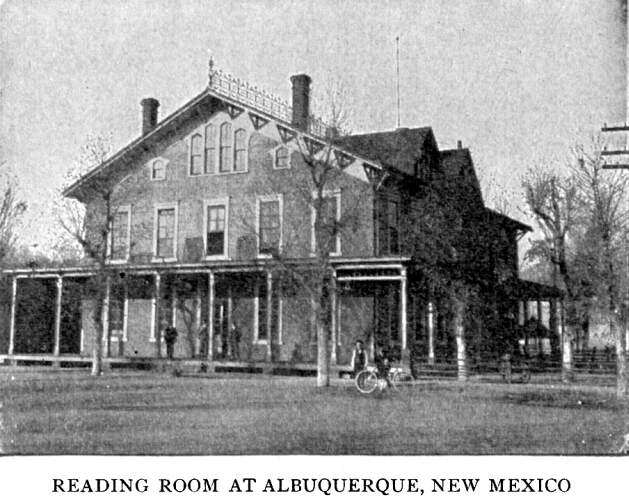 In regard to the reading matter selected and
supplied, both instruction and entertainment are kept in mind.
After a certain period magazines, weeklies and dailies are sent
out from the reading rooms to the trackmen for their homes. It
is stated that of the books (the libraries are circulating under
reasonable regulations) forty per cent are fiction, fifteen pet
cent historical and fifteen per cent biographical, ten per cent
technical and ten per cent general literature, besides reference
books. About fifteen per cent of the books are in use all the
time. Furthermore the men buy books for their own homes; they
send lists to the superintendent who delivers them free anywhere
on the system, bills for purchase at trade discount being paid
through the librarians. In regard to the reading matter selected and
supplied, both instruction and entertainment are kept in mind.
After a certain period magazines, weeklies and dailies are sent
out from the reading rooms to the trackmen for their homes. It
is stated that of the books (the libraries are circulating under
reasonable regulations) forty per cent are fiction, fifteen pet
cent historical and fifteen per cent biographical, ten per cent
technical and ten per cent general literature, besides reference
books. About fifteen per cent of the books are in use all the
time. Furthermore the men buy books for their own homes; they
send lists to the superintendent who delivers them free anywhere
on the system, bills for purchase at trade discount being paid
through the librarians.
The writer has interviewed a number of railroad officials who
uniformly declare that the greatest need of the modern railroad
is to discover men who are fit to assume higher posts in the service.
To the credit of the Santa Fe reading rooms is to be placed the
fact that special aptitudes have been discovered and developed
through them which have led directly to promotions in the service.
Again, it is plain to be seen that such a physical betterment
of conditions, since railroading at best is hazardous and difficult,
fosters better spirit and service among employees. And, wholly
from the company's standpoint, the fact that constant enlargement
of the work is being planned for, affords the best evidence that
the investment is considered a good one.
Stories Page | Contents
Page
|







